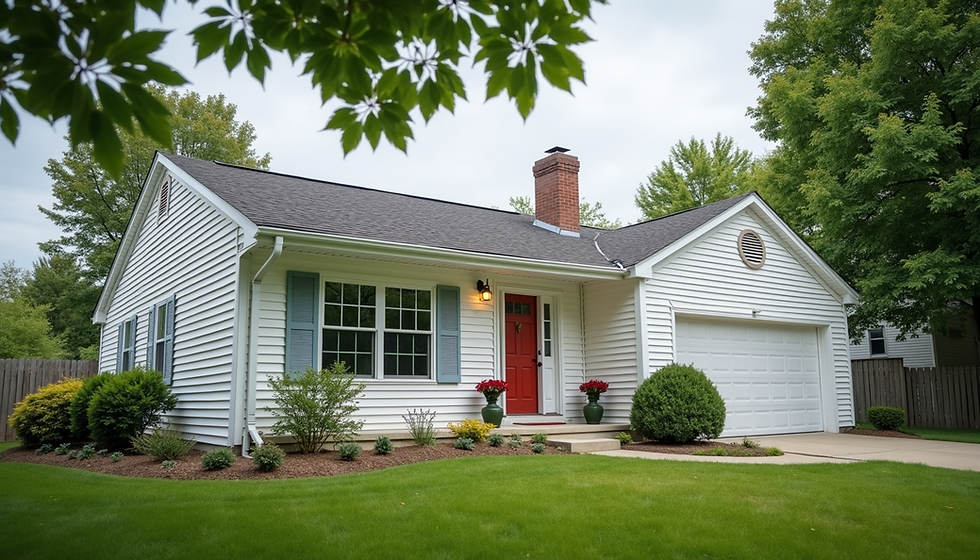Things to Consider Before Starting a Roof Replacement Project
- A&R Exteriors
- Jun 16, 2025
- 4 min read
Starting a roof replacement project can be daunting. A roof is one of the most crucial components of your home, and ensuring you make the right choices can save time, money, and stress. This blog post will guide you through the critical factors to consider before diving into a roof replacement project, so you'll be well-prepared when the time comes.
Understanding Your Roof Replacement Needs
Before initiating the roof replacement process, it’s essential to assess your current roof's condition and determine if a full replacement is necessary.
Start with an inspection. Look for signs of wear and damage, such as missing shingles, leaks, or sagging sections. According to the National Roofing Contractors Association, the average roof lasts about 20 to 25 years, depending on the materials used. If your roof is nearing this age and shows significant wear, it may be time for a replacement.

Consider the weather conditions in your area. Frequent storms, heavy snowfall, or extreme heat can impact the lifespan of your roof. Additionally, mold, mildew, and algae can contribute to deterioration, particularly in humid climates. If you notice any signs that your roof might be failing, it’s best to consult with a roofing professional to assess your options.
Choosing the Right Roofing Material
Selecting the appropriate roofing material is one of the most important decisions you will make during the replacement process. Various materials come with different costs, longevity, and aesthetic appeal.
Popular options include:
Malarkey Shingles: Cost-effective and widely used. Class 3 and 4 impact resistant shingles will save you 15-20% off your home owner insurance. Warrantied for 50 years.
Metal Roofing: Known for its durability and longevity, metal roofing can last 40-70 years. They are energy-efficient and often reflect sunlight, which can help reduce cooling costs.
Tile or Slate: These materials offer a unique aesthetic and can last over 100 years. However, they are heavier and may require additional structural support.

When choosing a material, factor in your budget, climate, and home style. Always consult with a professional roofing contractor who can provide you with tailored recommendations based on your specific needs.
Budgeting for Your Roof Replacement
Budgeting is crucial when planning for a roof replacement. The cost can vary widely depending on factors such as material choice, roof size, and labor costs. The typical price range for a roof replacement is between $8,000 to $15,000, but it can exceed that for larger homes or high-end materials.
In your budget, consider additional costs like:
Old Roof Removal: If you're replacing multiple layers of roofing, this could increase labor and disposal fees.
Upgrades: Ventilation, insulation, and skylights might be beneficial to include while the roof is being replaced.
Unexpected Repairs: During the replacement, you may discover underlying issues like rotten wood or structural damage, which could require additional funds.
Exploring roof financing options can help you manage the costs without breaking the bank. Look for local programs, low-interest loans, or even payment plans offered by contractors to ease the financial burden.

Selecting a Qualified Contractor
Not all contractors are created equal. Choosing a qualified and reputable contractor is perhaps the most vital step in a roof replacement project. Here are some tips to find the right professional:
Research: Look for reviews online, ask for recommendations from friends or family, and check their licensing and insurance.
Get Multiple Estimates: Don’t settle for the first quote. Getting at least three estimates can give you a clearer picture of the market.
Ask About Warranties: A good contractor should offer warranties on both materials and labor. Make sure to understand the terms before signing a contract.
Check References: Ask potential contractors for references to gauge the quality of their previous work. Don’t hesitate to follow up with past clients.
By taking the time to select a qualified contractor, you'll set the foundation for a successful and stress-free roof replacement.
Preparing Your Home for the Project
Before the roof replacement begins, it’s essential to prepare your home and yard to minimize disruptions. Here are actions to consider:
Move Vehicles: To facilitate easy access for the roofing crew, move your cars from the driveway and clear a path to your home.
Secure Outdoor Items: Store or secure any patio furniture, garden decorations, or items that could get damaged during the project.
Inform Neighbors: Let your neighbors know about the planned work, so they can prepare for potential noise and debris.
Arrange for Pets and Children: If you have children or pets, consider making arrangements for them to be elsewhere during the roof replacement to avoid stress.
Proper preparation will help the roofing process go smoothly and minimize inconveniences.
Ensuring Quality and Safety During the Project
Once the replacement begins, your primary concerns should be quality and safety.
Make sure your contractor follows local building codes and safety standards throughout the project. Employees should wear appropriate safety gear, use proper ladders, and secure the work area to prevent accidents.
Regularly communicate with your contractor to monitor the project's progress and ensure it aligns with agreed-upon timelines and specifications. Don’t hesitate to ask questions or express concerns.
Finally, conduct a final walkthrough upon project completion. Check for any missed details or defects that need addressing before settling the payment.
Final Thoughts
A roof replacement is a significant investment that requires careful consideration and planning. By assessing your current roof, choosing the right materials, and selecting a qualified contractor, you can set yourself up for a successful project.
Stay informed about budget considerations, project timing, and preparation needs to ensure your experience is as smooth as possible. Remember, exploring your roof financing options can also make the financial aspects more manageable. With thorough planning and the right professionals, you can achieve a safe and durable roofing solution for your home.




Comments